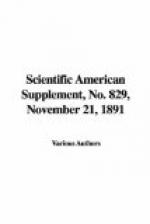We have had in view, in the above description, a man in the prime of life, in the center of growth, and decay. In regard to the force of animation in him, let us look at him now retrospectively and prospectively. In the past his has been a growing, developing body, and in the course of development he has produced an excess of force commensurate with the demands of his growth; this has enabled him gradually to bear more fatigue and more exposure, without exhaustion, and even with ease, until he has reached his maximum. When he has stopped in development, when he stands on a fair level with the external forces that are opposed to him, then his own force, for a short time balanced, soon stands second in command. He feels cold more tenderly; if his rest be broken, the demand for artificial heat is more urgent; if he lose or miss food, he sinks quickly; and, returning to our facts, as to the influence of the external temperature on mortality, these are the reasons why a fall in the thermometer sweeps away our population according to age so ruthlessly and decisively.
If we analyze the facts further by the side of the diseases which kill the old, we find those diseases to be numerous in name, but all of two types. They are diseases which of themselves tend either to produce undue loss of force, or that tend to prevent the development of force at its origin. Thus affections which are accompanied with exhaustive loss of fluids from the body, such as diabetes, dropsies, and haemorrhages, are of the first class; affections in which due supply of air to the lungs is prevented are of the second class, especially bronchitis, a disease so commonly assigned as the cause of the deaths among the members of the aged and enfeebled population, that succeed immediately on an extreme fall of the thermometer.
FALL OF TEMPERATURE—MODE OF ACTION.
In what has been written above I have stated simply and in open terms the fact that the fall of temperature produces a specified series of results, by reducing the force of the living organism, and disposing it to die. We may from this point investigate, from a physiological point of view, the mode by which the effect is produced in the economy. How does the decline of temperature act? Is the process simple or compound?
EXTRACTION OF HEAT.
The process is compound, and into it there enter three elements. In the first place, the body is robbed rapidly of its waste force, and the reserve and active elements of force are, consequently, called upon to the depression of the organism altogether. This obtains because the medium surrounding the body, the air, unless it be artificially heated, removes from its contact with the body a larger proportion of heat than can be spared; and it might be possible to produce such an influence on the body by sudden extraction of its heat as to destroy it at once by the mere act.




